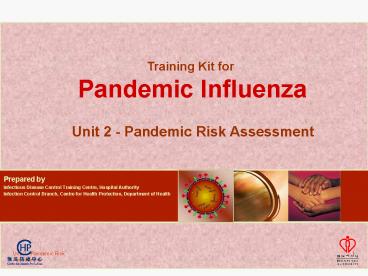Training Kit for - PowerPoint PPT Presentation
1 / 17
Title:
Training Kit for
Description:
Virology. Clinical features. Literature Review ... Virology. Adaptive mutation / reassortment. Stability in environment. Duck as a source & reservoir ... – PowerPoint PPT presentation
Number of Views:62
Avg rating:3.0/5.0
Title: Training Kit for
1
Training Kit for Pandemic Influenza
Unit 2 - Pandemic Risk Assessment
Prepared by Infectious Disease Control Training
Centre, Hospital Authority Infection Control
Branch, Centre for Health Protection, Department
of Health
2
By the end of this unit, you will be familiar
with
Objectives
- the various components of pandemic risk
assessment - some insights about the forthcoming influenza
pandemic - the HA infectious disease outbreak response
- impact of risk assessment
3
Pandemic risk assessment
Epidemiology
Virology
Clinical features
Continuous Situation update
Literature Review
To Access Pandemic Risk
Define Refine criteria for activation of Alert,
Serious and Emergency Response Levels for clear
response
4
Risk AssessmentEpidemiology
- Outbreak in poultry
- Human cases in neighbouring countries
- Local cases
- Epidemiological data of cases
- Risk of human to human transmission other mode
of transmission
For the most current update, please refer to
Updated Global Situation of Human Avian Influenza
Infection
5
Risk AssessmentEpidemiology
- Cumulative number of confirmed Human Cases of
Avian Influenza A/ H5N1 Reported to WHO
From WHO website, accessed on 14 March 2007
total number of cases includes number of
deaths WHO reports only laboratory-confirmed cases
6
Risk AssessmentVirology
- Adaptive mutation / reassortment
- Stability in environment
- Duck as a source reservoir
- New animal hosts
- Pathogenicity
- Cytokine inducing property
- Drug Resistance
- Infections in non-avian species
- Vaccine production (Vaccine availability, safety
efficacy)
For the most current update, please refer to
Updated Global Situation of Human Avian Influenza
Infection
7
Forthcoming Pandemic - The Potential
- The H5 influenza virus is evolving in favor of a
pandemic
- H5N1 endemic in poultry in SE Asia
- More pathogenic to poultry
- Survives longer in environment (up to 6 days)
- Expanded mammalian hosts
- Kills migratory birds
- Asymptomatic ducks as reservoir
- Human infection with HPAI, with limited spread to
close contact - Probable human-to-human transmission documented
8
Forthcoming Pandemic - The Severity
2. Resemblance to 1918 pandemic
- Gradual adaptation of an avian to a human-like
virus - (HPAI strains HA gene purely of avian origin)
- High case fatality
- Attack the young and healthy
- Primary viral pneumonia
9
3. Vaccine against Avian Influenza
Forthcoming Pandemic - The Vaccine
- Effective vaccine not available
- Time for first dose of vaccine 4 - 6 months
- Booster doses might be required
- Split or subunit vaccine might NOT be immunogenic
enough
10
HAs Response for ID outbreaks (Avian Flu
activation triggers)
- HAs response plan for infectious disease
outbreaks - covers the contingency response taken by the HA
in the event of a major outbreak of infectious
disease - It is a generic plan designed for infectious
diseases - three levels of response correspond to the
potential impact of the outbreak to the hospital
systems the community - Alert response
- Serious response (S1 and S2)
- Emergency response (E1 and E2)
- The activation triggers for avian flu
- Disease activity in wild birds / poultry / humans
- Disease activity inside or outside Hong Kong
territories
11
HAs Response for ID outbreaks (simplified)
Alert Response Level
Human avian flu case
12
HAs Response for ID outbreaks (simplified)
Alert Response Level
13
HAs Response for ID outbreaks (simplified)
Serious Response Level S1
14
HAs Response for ID outbreaks (simplified)
Serious Response Level S2, Emergency Response
Level E1 and E2
Human avian flu case
15
Hong Kong Government Response Systems HAs
Response of Infectious Disease Outbreaks
16
Impact of Risk Assessment
- Accurate risk assessment will help to
- Initiate right actions at the right time
- Surveillance
- Diagnostics
- Clinical Management
- Infection control measures
- Stockpile use of anti-viral agents
- Alert frontline colleagues on potential cases of
H5N1 (with FTOCC) and case notification and
management arrangements - Alert to warning signals, e.g. cases clusters in
HCW, residential premises
17
End of Unit 2































